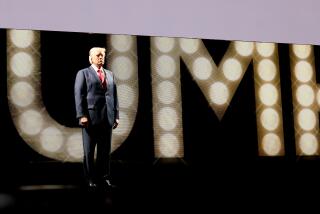Michael Steele out as Republican Party picks a new leader
- Share via
Reporting from Oxon Hill, Md. — Michael Steele’s troubled reign as Republican national chairman came to an abrupt end Friday when party leaders rejected him in favor of a former sidekick, Wisconsin party Chairman Reince R. Priebus.
Priebus was instrumental in Steele’s ascent to the top job two years ago and led his transition team. He was rewarded with the post of general counsel of the Republican National Committee, but he broke with Steele after the November election, saying the party organization had become dysfunctional and had lost the confidence of its major donors.
“We have to get on track, and together we can defeat Barack Obama in 2012,” the new chairman said after his victory, which took seven ballots and more than four hours of voting.
Priebus is a litigator at a Milwaukee law firm. At 38, he becomes the youngest national GOP chairman since 1988, when President George H.W. Bush gave the job to his 37-year-old campaign strategist, Lee Atwater.
The vote was a clear repudiation of Steele, who had surprised many in the party by seeking another term. The first African American to head the committee, Steele never led in the balloting, which was conducted at a convention hotel in his home county in the Maryland suburbs. He ran second in the first round against several challengers, earning only 44 of the 85 votes needed to win, and steadily lost support in subsequent rounds.
Steele withdrew after four ballots and threw his support to Maria Cino, a former George W. Bush administration official on leave from her job as a lobbyist for Pfizer Inc., the pharmaceutical giant.
“It’s very clear the party wants to do something a little different, and hopefully a little bit better,” Steele said in a brief concession speech.
Only the 168 committee members — three from each state, the District of Columbia and U.S. territories — had a voice in the selection. Priebus was elected with 97 votes to 43 for Michigan committeeman Saul Anuzis and 28 for Cino. Former RNC official Ann Wagner of Missouri withdrew after the sixth ballot.
Priebus is likely to assume a less prominent public role than that of Steele, who became a magnet for controversy during his two years at the helm. The former Maryland lieutenant governor never overcame internal opposition from many in the party establishment after his upset victory in January 2009.
Among those involved in the effort to defeat him were former Vice President Dick Cheney and the new Republican House speaker, Rep. John A. Boehner of Ohio. Both supported Cino, who has held positions with the party committee.
Steele’s defeat concluded a divisive, and often embarrassing, period for the Republican Party. The former Fox News commentator was initially chosen, at least in part, because of his reputation as a charismatic speaker. Some saw his election as a signal that Republicans wanted to change their image and broaden the party’s appeal to independent voters.
Steele saw himself as a counter to the nation’s first black president. But he struggled to adjust to his role as party spokesman. He stumbled often, tripping over bedrock GOP tenets such as opposition to abortion and support for the war in Afghanistan.
His efforts to enrich himself, through paid speechmaking and a book he wrote without the knowledge of party officials, rubbed many the wrong way. Critics repeatedly accused him of putting his ambitions above the party’s interests.
The disclosure that about $2,000 in party money had been spent at a risque West Hollywood nightspot highlighted lax financial management at GOP headquarters in Washington.
Steele leaves a debt of about $22 million, which officials said would take more than a year to retire.
In his campaign for chairman, Priebus promised “less drama, more hard work, more results and more focus on winning.”
In a victory speech to the party committee, Priebus said he would “serve in humility and work hard.” He also said Republicans needed to “recognize that there’s a steep hill” ahead going into the 2012 elections.
Later, he told reporters the party needed to raise about $400 million over the next two years, more than twice the amount collected under Steele.
Priebus denied the existence of a split between the party establishment and conservative activists.
“Our party is part of the conservative movement in this country,” he said. “We’re not in competition with it.”
More to Read
Get the L.A. Times Politics newsletter
Deeply reported insights into legislation, politics and policy from Sacramento, Washington and beyond. In your inbox three times per week.
You may occasionally receive promotional content from the Los Angeles Times.










